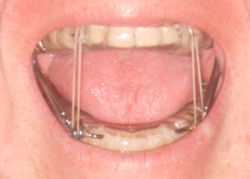Mandibular advancement device (MAD)
A mandibular advancement device (MAD) or mandibular advancement splint (MAS) is a device worn in the mouth that is used to treat obstructive sleep apnea (OSA) and snoring. These devices are also known as "dental devices" "sleep apnea oral appliances," and "sleep apnea mouth guards."
The device treats snoring and sleep apnea by moving the lower jaw forward slightly, which tightens the soft tissue and muscles of the upper airway to prevent obstruction of the airway during sleep. The tightening created by the device also prevents the tissues of the upper airway from vibrating as air passes over them – the most common cause of loud snoring.
Where appropriate, they are considered a good therapy choice as they are non-invasive, easily reversible, quiet, and generally well accepted by the patient. The focus of improvement in appliance design is in reducing bulk, permitting free jaw movement (i.e., yawning, speaking, and drinking), and allowing the user to breathe through their mouth (early "welded gum shield"-type devices prevented oral breathing).
There are a number of oral devices available to patients suffering from obstructive sleep apnea and snoring. The efficacy of these devices varies greatly, as does the quantity and quality of the research behind them. Many professionals believe CPAP is the most effective treatment, although MAD is easier to use. While MAD may be a valid treatment for those with mild sleep apnea, the devices seem to be less effective at treating moderate to severe sleep apnea.
Drawbacks
Many health plans do not cover mandibular advancement devices because they are a relatively new form of treatment. Patients often pay upwards of $2000 out of pocket to secure these devices. These devices can also be somewhat uncomfortable, although many patients find them less bothersome than CPAP mask treatment. Improperly fitted devices can cause teeth to shift over time, leading to significant dental problems. Regular dental checkups and adjustments to the oral device can prevent these problems. Morning jaw exercises can reduce pain and jaw dislocation, helping patients to retain a normal bite pattern.

Donate to Apnea Board
